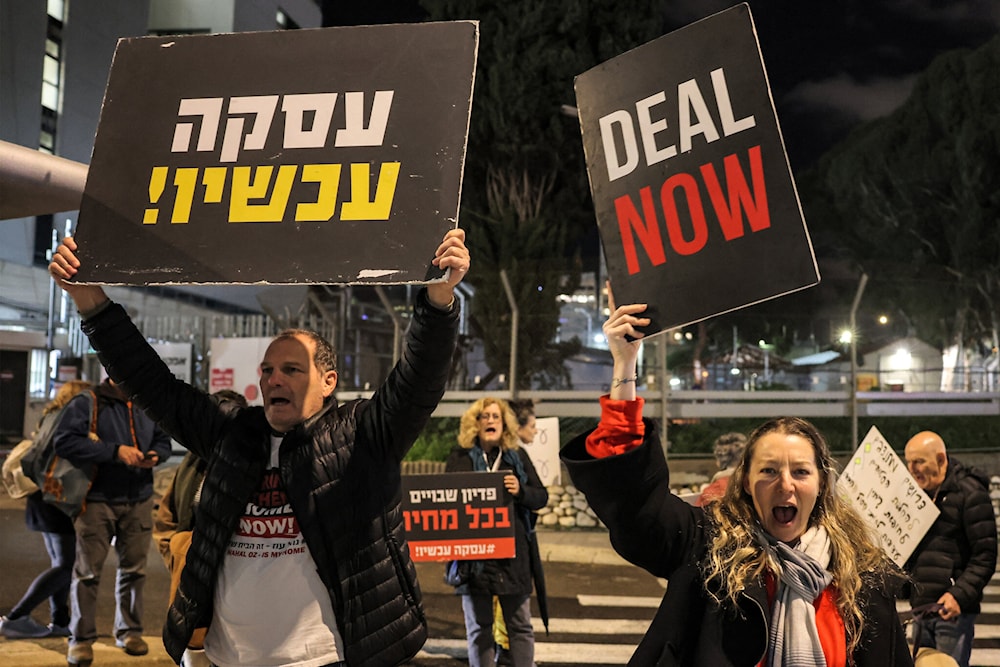Captives lives, Hezbollah war hinge on negotiations: Israeli media
An Israeli analyst warns that today the most crucial and primary issue in the occupation entity is the fate of the negotiations.
-

Families of Israeli captives held in the Gaza Strip gather with supporters for a demonstration demanding an immediate deal for their release as they block off a road near the Security Ministry in Tel Aviv on January 29, 2024. (AFP)
Israeli media warned on Tuesday about the potential "freeze in negotiations" and its implications, amid increasing Israeli devastating bombings in Gaza, including the recent horrific massacres in Khan Younis.
Zvi Barel, a Middle East affairs analyst for the Israeli newspaper Haaretz, said that a stalemate in negotiations might last until the November US elections, which Netanyahu hopes Donald Trump will win.
Read more: Settlers demonstrate in al-Quds calling for exchange deal
However, he described waiting for Trump's victory to complete the negotiations as "dangerous", quoting an Israeli source close to the negotiations who said, "No one can say today what Trump's policy will be regarding the war in Gaza, and there is no guarantee that he will support Prime Minister Netanyahu's policy."
The Israeli occupation committed a brutal massacre in al-Mawasi last Saturday, killing and wounding over 400 Palestinians, claiming that they had targeted al-Qassam's chief Mohammed Deif.
Hamas released a statement shortly confirming that its senior military leader is alive and well. The Resistance group slammed the occupation for trying to justify the massacre by claiming it was an attempt to assassinate Deif.
Netanyahu and the occupation army later concluded that they were not certain the bombing killed the top military chief.
On that, Barel said that "Israel" is still waiting for indications about Deif's fate and is waiting for signs to make sure that the assassination was successful.
Read more: Who is Mohammad Deif, the Resistance leader, bane of 'Israel'?
Faulty assessment
Regarding the prisoner exchange deal, the Israeli analyst mentioned that Israeli political and military officials had confirmed that their assessment before deciding to target Deif was that his assassination would halt the negotiations. However, this did not occur, as the negotiations continued despite the attempt.
Meanwhile, Barel stressed that the fate of the prisoner exchange deal is the main and crucial issue, yet there is significant uncertainty about whether it would go through currently or not.
In "Israel", these negotiations are defined as "negotiations about the release of prisoners," while Hamas and the mediators define them as "negotiations for a ceasefire and an end to the war," he explained.
Read more: 'Israel' not giving clear answers regarding Hamas demands: Exclusive
The Israeli analyst also touched on the northern front, stating that aside from endangering the lives of captives, the other tangible threat is that the longer the negotiations are delayed, the greater the chances of a full-scale war with Lebanon.
Conversely, he recalled Hezbollah's assurances that it would adhere to a ceasefire, linking the northern front's calm to a ceasefire in Gaza, while highlighting similar messages from Yemen and Iraq.

 3 Min Read
3 Min Read








